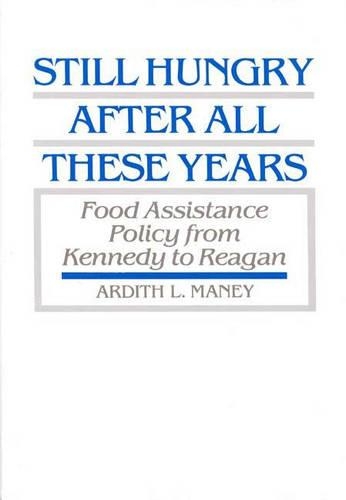
Still Hungry After All These Years: Food Assistance Policy from Kennedy to Reagan
(Hardback)
Publishing Details
Still Hungry After All These Years: Food Assistance Policy from Kennedy to Reagan
By (Author) Ardith Maney
Bloomsbury Publishing PLC
Praeger Publishers Inc
27th March 1989
United States
Classifications
Tertiary Education
Non Fiction
Dietetics and nutrition
363.88
Physical Properties
Hardback
203
Description
In the 1980s, record numbers of Americans have qualified for food stamps and food aid in other forms, despite increasingly rigid standards of eligibility. After more than two decades of such assistance, hunger and malnutrition remain widespread among low-income groups in the United States. This new study examines the policy processes that have shaped food assistance programs since the Kennedy administration and looks at prospects for resolving the political stalemate over food aid that has overtaken national policy. Following an analysis of the dynamics of the policy process, Professor Maney explores the various changes that have affected assistance policy since its first phase beginning in 1933. She describes the shifting course of aid policy, which first aimed at supporting farm income and disposing of agricultural surpluses and more recently has attempted to deal primarily with hunger and severe malnutrition. Focusing on conflicts over policy objectives and budget, the author traces the ups and downs of the struggle between the executive branch and Congress to control both policy and appropriations. Other topics considered are the role of Department of Agriculture planners and administrators, the influence of powerful agricultural interests, the efforts of antipoverty and civil rights activists to secure more equitable food distribution in the rural South, and the effects of joblessness on food assistance policy. A clear and balanced analysis of one of the gravest policy dilemmas facing the nation, this book is an important resource for professionals, politicians, academics, and students concerned with public policy, social issues, government, and contemporary political economy.
Reviews
. . . Still Hungry After All These Years is a readable, interesting, and comprehensive investigation of food policy changes over a long time. Because of its emphasis on political context, its relevance is not only to food assistance policy; the book can be used to explore broad forces that influenced many social policy developments of the era. It is an excellent and important study.-Political Science Quarterly
Maney attempts to examine a particular policy area in order to shed light on the political/bureaucratic policy-making and implementation mechanisms in the US. In this respect, it is similar to a number of other works, for example, M. Morris and J. Williamson's Poverty and Public Policy or A.L. Fritschler's Smoking and Politics. When compared to such books, this work breaks no new ground or adds substantially to the literature. However, the book makes a major contribution in its discussion of government food assistance policy from its inception through Reagan. Maney has not written a polemic, but a carefully documented and well-reasoned analysis of the motivations and consequences of these policies. She has carefully avoided political blame or partisanism in her criticism of food assistance programs. Recommended for all libraries and for all those interested in social welfare policies in the US.-Choice
Maney has made a useful contribution by giving us a full history of the food program during the 1960s and by providing a case study of how a particular set of Great Society programs was shaped by the political and ideological cross-currents of that turbulent decade....-APA Journal
." . . Still Hungry After All These Years is a readable, interesting, and comprehensive investigation of food policy changes over a long time. Because of its emphasis on political context, its relevance is not only to food assistance policy; the book can be used to explore broad forces that influenced many social policy developments of the era. It is an excellent and important study."-Political Science Quarterly
"Maney has made a useful contribution by giving us a full history of the food program during the 1960s and by providing a case study of how a particular set of Great Society programs was shaped by the political and ideological cross-currents of that turbulent decade...."-APA Journal
"Maney attempts to examine a particular policy area in order to shed light on the political/bureaucratic policy-making and implementation mechanisms in the US. In this respect, it is similar to a number of other works, for example, M. Morris and J. Williamson's Poverty and Public Policy or A.L. Fritschler's Smoking and Politics. When compared to such books, this work breaks no new ground or adds substantially to the literature. However, the book makes a major contribution in its discussion of government food assistance policy from its inception through Reagan. Maney has not written a polemic, but a carefully documented and well-reasoned analysis of the motivations and consequences of these policies. She has carefully avoided political blame or partisanism in her criticism of food assistance programs. Recommended for all libraries and for all those interested in social welfare policies in the US."-Choice
Author Bio
ARDITH L. MANEY is an Associate Professor of Political Science at Iowa State University. Among her earlier publications are Representing the Consumer Interest and Government and Employer Roles in Child Care Policy.
